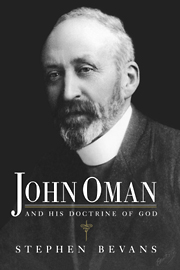2 - A theologian between two centuries
Published online by Cambridge University Press: 05 September 2009
Summary
“Conditions do not contain the full causal explanation of intellectual phenomena,” said Wilhelm Dilthey. All they do “is to confine the variability of that which originates within certain boundaries.” To say this, however, is still to say quite a lot about the contextuality of a person's thought. It points to the relative importance of knowing the “world” in which a person lived and developed, if one is adequately to understand that thought. Despite Dilthey's reservations, therefore, what Thomas A. Langford says at the beginning of his book on early twentieth-century British theology must be taken with utmost seriousness:
The importance of a cultural ethos and the reciprocity that exists between a person and his time make necessary the effort to set theologians into their surroundings and to allow the interplay between intellectual developments and historical events to have its full strength. The era and the men of the era with their ideas and actions, are parts of a single story; each person and each occasion has its own integrity, yet each is intrinsically related to the others.
In many ways John Oman matches perfectly the portrait of Victorian attitudes that W. E. Houghton paints in his The Victorian Frame of Mind. He is concerned with duty and earnestness and self-fulfillment; he is critical of power and hypocrisy. But in significant other ways Oman is concerned with particularly twentieth-century issues: with authenticity and freedom, with issues of meaning raised by the Great War, and with commitment and faith in a world which considered skepticism the “mark of intellectual sophistication.”
- Type
- Chapter
- Information
- John Oman and his Doctrine of God , pp. 18 - 40Publisher: Cambridge University PressPrint publication year: 1992

